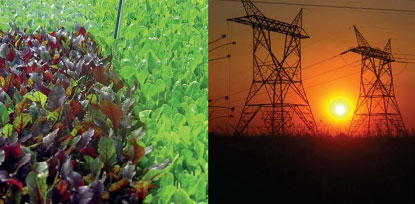| can we have economic growth by consuming less rather than more resources? |
Global economic thinking is currently experiencing a paradigm shift from capital-focussed, resource-intensive development towards what is being called the green economy. This shift has been intensified by the global economic crisis. |
| |
A green economy is one where business processes and infrastructures are reconfigured to:
- deliver better returns on natural, human and economic capital investments, while at the same time
- reducing green house gas (GHG) emissions
- and extracting using fewer natural resources
- creating less waste
- reducing social disparities
UNEP 'Global Green New Deal: An Update for the G20 Pittsburgh Summit', ii |
|
| |
Thus green economies – also called low-carbon economies – grow by reducing rather than increasing resource consumption.
Swilling, 'Growth, Resource Use and Decoupling: Towards a Green New Deal for South Africa', 5 |
'There can be little doubt that the economy of the 21st century will be low-carbon. What has become clear is that the push toward decarbonisation will be one of the major drivers of global and national economic growth over the next decade. And the economies that embrace the green revolution earliest will reap the greatest economic rewards.'
Former British Prime Minister Gordon Brown (September 2009) 'Newsweek' |
| what compels us to follow this path? |
| There are major new challenges arising from ecological constraints to the ‘business-as-usual’ approach to growing economies.
The dominant economic growth and development paradigm fails to address a wide range of underlying resource constraints that can rapidly undermine the preconditions for the kind of developmental growth that is required to reduce inequalities and poverty over time.
UNEP, 'Global Green New Deal: An Update for the G20 Pittsburgh Summit', ii |
'While recently we have heard much about how problems on Wall Street are affecting innocent people on Main Street, we need to think about those people around the world with no streets. Wall Street, Main Street, no street: the solutions devised must be for all.'
Ban Ki-Moon, UN Secretary-General |
 |
| and how do we walk it to achieve economic realignment? |
| To realign economies to focus not only on GDP, but also on long-term sustainability, job creation and ‘happiness’ requires: |
shifting from capital investment to strategic investments in
- knowledge and innovation systems
developing new skills in
- renewable energy, e.g. solar water heating
- local food production
- urban agriculture
- energy audits
making new investments in infrastructure/planning around
- water
- transportation
- alternative energy systems and production
creating new green jobs
introducing new regulations to
- encourage development near planned public transport nodes
- curb urban sprawl
|
|
| |
| |
| |
What are green jobs?
work in agricultural, manufacturing, R&D, administrative and service activities that contribute substantially to preserving or restoring environment quality.
UNEP, 'Green Jobs: Towards Decent Work in a Sustainable, Low-Carbon World', 3 |
| |



